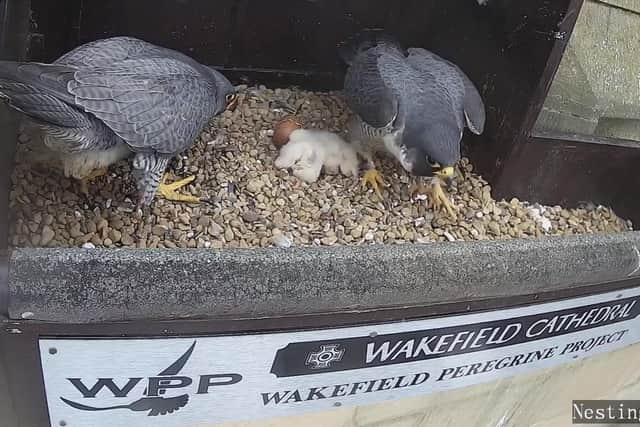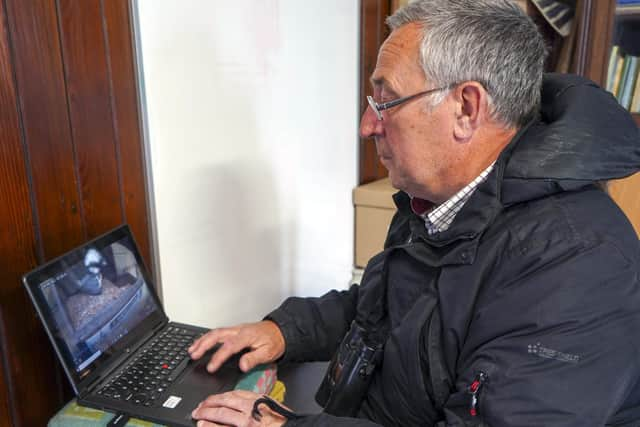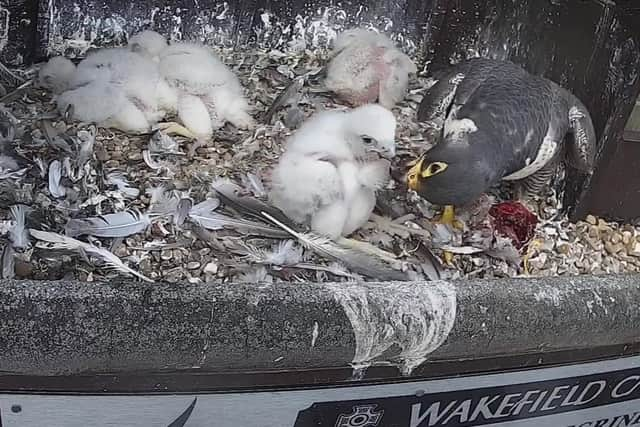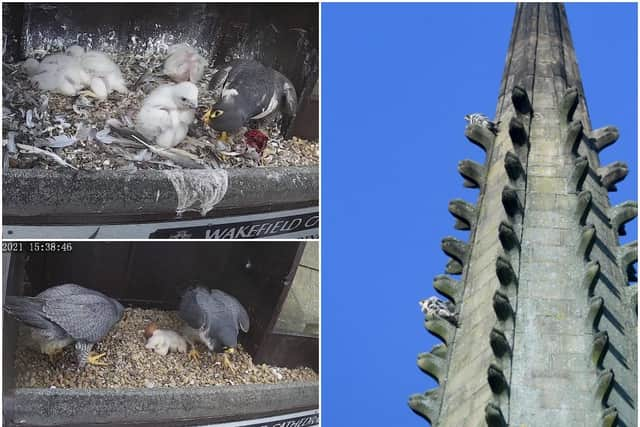'It's been absolutely crazy' - delight as Wakefield Peregrine Project draws international audiences amid growing interest in newly-hatched chicks
and live on Freeview channel 276
The city’s mating pair have welcomed four new chicks in recent weeks, much to the delight of thousands of followers who track the birds’ every move through a livestream on YouTube.
And while the hatching is always of interest to keen birdwatchers, those behind the peregrine project say they have been amazed by the response to the arrival of this year’s chicks.
Advertisement
Hide AdAdvertisement
Hide AdFrancis Hickenbottom, who heads the project, has been inundated with requests for interviews since the first eggs were laid in the Wakefield Cathedral nesting box, and appeared in The Times earlier this year.


He was even invited to appear on Australian TV to discuss the birds - though the interview was scrapped at the last minute when the news of Prince Philip’s death broke.
Francis said: “It’s always busy but this year in particular it’s been absolutely crazy.
“There are two periods when things go bananas: one is when the first egg is laid and the next is when the first chick hatches.
Advertisement
Hide AdAdvertisement
Hide Ad“We’ve given them a bit of a helping hand by putting a nesting box there because everything they want is there.


“All they need is a level surface with a surface like gravel. We’ve just given them a helping hand. We’re doing everything we can to help them.”
Francis says he has also noticed increased interest from schools in recent months, with teachers getting in touch to invite him to teach their pupils about the falcons and project.
And, although the usual publicity events have not been able to go ahead, he says people in Wakefield still have a keen interest in the falcons.
Advertisement
Hide AdAdvertisement
Hide AdHe said: “If you’re in the town centre what you’ll see is people going about their shopping and pause to look up at the spire, because lots of people know about them.


"They will look up to see if there’s a bird around. Quite a few will see me sat on the bench and come to see how they’re doing."
Peregrine Falcons are medium-sized prey birds traditionally found on cliffs and upland areas. In recent years, more of the birds have been spotted in cities, with the high vantage point and easy supply of prey of Cathedrals proving a key attraction.
Their population shrank rapidly in the 20th century, a phenomenon linked to the widespread use of agricultural chemical DDT, which was found to reduce the birds' breeding performance and cause the thinning of eggshells, meaning far fewer birds survived the incubation period.
Advertisement
Hide AdAdvertisement
Hide AdHowever, in recent years their population has recovered rapidly, in part thanks to the work of projects such as the one in Wakefield.


The Wakefield Peregrine Project was first launched in 2015, after a pair of the rare birds were spotted searching for a home in the city.
Since then, the falcons have welcomed a total of 25 chicks, including four which have hatched in recent weeks.
This year, the chicks hatched in late April, and are expected to fledge the nest after five or six weeks, likely in the first few weeks of June.
Advertisement
Hide AdAdvertisement
Hide AdA livestream of the nesting box, which runs permanently on YouTube, has since been viewed millions of times, racking up an incredible 811 thousands visits in 2020 alone.
The Wakefield Peregrine Project also works closely with other, similar projects across the country, as part of an effort to track the growing peregrine population.
Francis said that the city's male bird was first spotted in Sheffield in 2014, before settling in the city.
And in more recent years, chicks from Wakefield have been spotted across the country, with one settled on a viaduct south of Durham.
Advertisement
Hide AdAdvertisement
Hide AdFrancis said: “People get attached to their birds. The people in Sheffield are interested in young at Durham because our male peregrine in Wakefield came from Sheffield.
"People who follow in that way. In Norwich their female came from the nest at Bath.
"A few weeks ago we had news from Durham. One of our young birds has been living on a local viaduct three miles south of Durham.
"We are just waiting for the day when one of our young peregrines is seen breeding in some city such as Bath."
Visit wakefieldperegrines.com to find out more or view the livestream of the falcons.